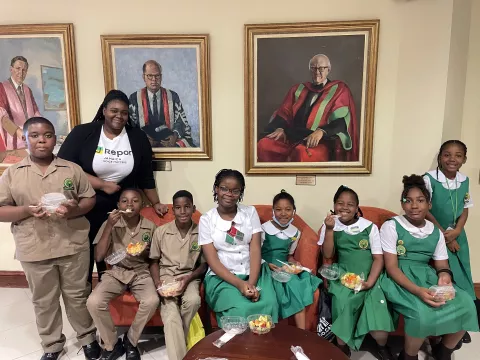Pirate ships, bridges, flowers, dinosaurs, cars, castles, trains, tents, campfires, palm trees and house. What do they have in common?
A child’s imagination, sparked by block play.
Recently, with UNICEF support, children across Kingston have been exercising their creativity and critical thinking skills as well life skills such as patience and teamwork, while playing with a set of big, blue blocks. Block play may look simple, and it is, because all it takes is a set of blocks of various sizes and shapes. They can be made from wood, plastic, foam or even cardboard, but the impact on sensory, motor and intellectual development is profound.
When a child plays with blocks, we see focus, social interaction, problem-solving, the use of math concepts, vocabulary skills, as well as spatial awareness.

“I made a pirate ship because I read about it in books. I made a sword, too!” exclaimed 7-year-old Sahria Gooden, while describing her Imagination Playground experience which was part of a collaborative effort between Project Star and UNICEF at a recent summer camp at Highholborn Street Basic School. Project Star is a social and economic transformation initiative of the Private Sector Organisation of Jamaica (PSOJ).
The big, blue blocks are central to the Imagination Playground movement. This innovative mobile system transforms any space into a playground – indoors or outdoors. Children of all ages direct their own play and explore ways to control and shape the big world around them by interacting with these large foam blocks of various shapes and sizes – cubes, bricks, cogs, curves and cylinders – that fit together. Houses, pirate ships and cars, emerge as do flowers, palm trees and campfires in line with whatever the young minds imagine. There is no right or wrong way to use your imagination to create items for play.
Play isn’t another thing to do or an add-on. It’s an approach, a different way to engage children, and it is for everyone, everywhere. More time playing means more time engaging your imagination, relaxing and having fun while developing the resilience, independence, confidence and coping mechanisms needed to thrive in a constantly changing world. Play can also be a form of much-needed psychosocial support, helping to relieve stress and anxiety and mitigating the effects of violence and other traumatic experiences.
A right for all children, UNICEF is committed to facilitating safe spaces to play for families and communities around the world. In Jamaica, work continues with the Ministry of Education and Youth to structure regular and increased access to the Imagination Playgrounds and to advocate for the inclusion of play in the build out of the “pocket parks” and other similar spaces around the island. At home, while wooden blocks are durable and aesthetically pleasing, blocks can be upcycled from many different items including shoe boxes, paper towel and toilet paper rolls, cereal boxes, soap boxes as well as regular cardboard boxes of various shapes and sizes. Cardboard blocks can also be made by cutting pieces and gluing them together.
Experience the power of play today! Buy or make some blocks, use Legos if you have them and have a block party! Discuss what you made together and why. The possibilities of combining the blocks and the following conversations are virtually limitless. Remember, block play is anything but basic; it’s complex in the best kind of way because you control what you create. Those skills and memories are priceless.
What UNICEF is doing
As part of overall support to the Ministry of Education and Youth’s Learning Recovery and positive parenting efforts, UNICEF continues to work on interactive, child-centred teaching and learning, by promoting opportunities to play as well as contributing to the development of interactive learning tools. These include the Accessible Digital Textbook and the soon-to-be available Learning Passport Jamaica (LP Jamaica), an online and offline mobile platform that enables continuous access to quality education. In its first phase, the LP Jamaica will support specific catch-up learning for grades 1-3 and includes the fun, Summer Spark content on social media @unicefjamaica.





